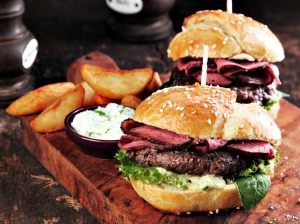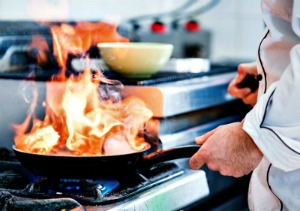What Type of Insurance Do You Need for a Restaurant?

If you’re succeeding in the competitive restaurant business, you don’t want to ruin it by not having the right restaurant insurance coverage.
Owning a restaurant is no easy task. There’s a reason so many eateries are out of business less than a year after opening.
A single fire, employee lawsuit or customer injury could shut down an otherwise thriving restaurant. Insurance experts say that all restaurant owners need to talk to insurance agents to discuss the unique insurance needs of their eateries.
CHECK OUT: Guide to Insurance for Building Contractors
“The hospitality industry can be a risky business if its potential liability exposures are not properly identified and addressed prior to a claim being made,” says Robert Fiorito, vice president of insurance provider HUB International Northeast. “Owners are getting hit with claims and facing insurance increases. A proper risk management and safety program will help businesses run more profitably and effectively by identifying and minimizing risks before they turn into claims.”
Essential insurance coverage for restaurants
Dana Gold, insurance consultant with Dana G. Gold Risk Management and Insurance Consulting Services in Atlantic Beach, New York, says that there are certain coverages every restaurant owner must purchase.
Gold recommends first that restaurant owners invest in a property insurance policy, but not just a standard one. Restaurant owners should include business interruption insurance with their property insurance.
RELATED: What Kind of Insurance Does a Church Need?
Standard property insurance covers physical damage and losses to a building, everything from stolen kitchen equipment to a fire that burns down an entire restaurant. The coverage can help owners pay the costs of replacing equipment or rebuilding.
Business interruption insurance, though, provides additional financial protection, reimbursing owners for the costs they suffer when their restaurant is shut down because of property damage. Restaurateurs don’t earn any money if their eatery isn’t open. Business interruption insurance reimburses owners for revenue lost because of their restaurant’s closure.
It also reimburses them for any cost they incur from operating temporarily from a new location.
Gold says, too, that restaurant owners need a solid commercial general liability insurance policy. This insurance protects owners against lawsuits filed by customers, visitors and any other visitors who suffer bodily injury while at their restaurants.
Say a diner slips and falls while eating at a restaurant. General liability insurance will cover the costs restaurant owners incur in defending against a lawsuit. Policies might also cover the medical expenses that injured parties incur.

General liability, though, only covers customers, guests and other visitors. Restaurant owners will also need workers’ compensation insurance to cover any legal or medical costs that their employees suffer while on the job.
Say a worker is burned while cooking in the kitchen and needs medical attention. Workers’ compensation insurance will help cover any medical costs the restaurant owner must pay.
Gold says that restaurant owners need to research their businesses carefully and frequently review their insurance policies. If they don’t, they might find that they aren’t adequately covered in the case of an employee injury or fire that shuts their business down.
The biggest mistake that owners make when insuring their restaurants? Gold says that it’s “relying on your broker and not understanding what is covered and more importantly, not covered under your policies.”
Michael Conlon, insurance producer at Chicago-based Insureon, said that restaurant owners can also consider what is known as a business owner’s policy.
Conlon says that this is an insurance bundle that restaurateurs can purchase in place of buying separate general liability and property insurance policies. In addition to including liability and property insurance coverage, a business owner’s policy will also include coverage for spoiled food, contamination and lost income if your restaurant has to shut down for a period.
Conlon says that liquor liability, too, is a must-have for any restaurant that will serve alcohol on the premises. This holds true even if the restaurant has a bring-your-own-beer policy, Conlon says. Liquor liability covers a restaurant if a patron drinks too much and injures someone or damages property.
Covering employees with restaurant insurance
Restaurant owners usually hire many employees. Unfortunately, with those employees come many potential legal issues.
That’s why Abtin Mehdizadegan, a defense attorney with Little Rock, Arkansas-based law firm Cross, Gunter, Witherspoon & Galchus, recommends that restaurant owners invest in employment practices liability coverage.
Employment practices liability insurance — usually referred to as EPL insurance — protects restaurant owners against claims made by their employees.
What if an employee claims that you denied her a promotion because of her age, sex or race? What if a waiter sues you for wrongful termination or your head hostess claims that you sexually harassed you? EPL insurance will help cover the costs of fighting a lawsuit brought by an employee and will cover any payout you need to make to settle a case or because of a judge’s decision.
As Mehdizadegan says, restaurant owners face a high risk of employee lawsuits simply because they hire so many workers to staff their eateries.
“Employment cases can come at unexpected times and when employers least expect them,” Mehdizadegan says. “A good EPL rider will help a company absorb the costs of litigation.”
Restaurant insurance costs vary greatly
How much will restaurant owners have to pay for insurance coverage? Conlon says that this can be difficult to estimate.
“Big caveats here: Insurance costs depend on the size of the business and the payroll,” he says.
 However, Conlon says that in general restaurant owners can expect to pay from $529 to $6,097 a year for general liability insurance and $1,011 to $2,233 for property insurance. They can expect to pay from $1,142 to $10,574 a year for a business owner’s policy, Conlon said.
However, Conlon says that in general restaurant owners can expect to pay from $529 to $6,097 a year for general liability insurance and $1,011 to $2,233 for property insurance. They can expect to pay from $1,142 to $10,574 a year for a business owner’s policy, Conlon said.
Worker’s compensation insurance can cost restaurant owners from $636 to $9,730 a year, while liquor liability insurance might run from $386 to $2,780 a year, Conlon says.
Insurance for a restaurant business, then, isn’t cheap. Owners need to carefully consider how much money their business could lose in the case of fire, theft, employee injuries or drunk-driving accidents.
“One thing that makes a restaurant’s risk different is that the inventory is perishable,” Conlon says. “If the power goes out, suddenly you could have thousands of dollars’ worth of sushi going bad. Contaminated food or a rotting inventory can be really expensive because you’ll be forced to shut down, clean up and restock. That means you’ll go days without earning any money.”
Conlon also recommends that restaurant owners give serious consideration to buying a business owner’s policy that includes coverage for spoilage and food contamination. Such a policy costs more, but it could pay off big if something goes wrong with a restaurant’s food.
“Spoilage and contamination are huge issues for restaurant owners,” Conlon says. “Don’t believe me? Ask Chipotle.”
